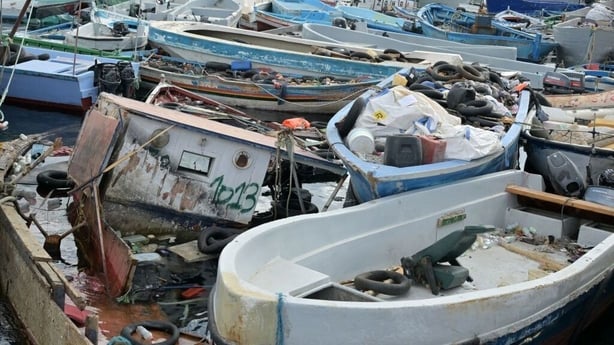The number of people who died or went missing while trying to cross the Mediterranean Sea this summer tripled since last year, the United Nations has said, adding it had become a "cemetery" for children.
Between June and August, at least 990 people died or vanished trying to migrate from north Africa to Europe, compared to 334 deaths over the same months in 2022, the UN's children's agency UNICEF said.
At least 289 children have died this year while trying to make the dangerous crossing, said Nicola Dell'Arciprete, UNICEF's country coordinator for Italy.
There were 11,600 unaccompanied minors among the migrants who arrived in Italy on makeshift vessels between January and September, up 60% on the first nine months of 2022.
"The Mediterranean has become a cemetery for children and their future," UNICEF's Regina De Dominicis said.
"The tragic toll of children dying in search of asylum and security in Europe is the result of political choices and a defective migration system," she added.
According to the UN High Commissioner for Refugees, 2,500 migrants died or went missing in the Mediterranean between 1 January and 24 September, 50% more than in the same period last year.
A surge of migrants arriving at Italy's Lampedusa island earlier this month - with some 8,500 arrivals in just three days -- will likely be repeated in coming weeks, said Mr Dell'Arciprete.
"We know that these are figures that could even rise in the coming months because there are a number of conflicts, natural disasters or even climate events in the countries of origin or transit of these minors".
EU's Mediterranean leaders meet on migration issue
The leaders of nine Mediterranean and southern European countries are meeting in Malta with European Commission President Ursula von der Leyen for talks focused on the thorny issue of migration.
The summit comes a day after EU interior ministers finally made headway on new rules for how the bloc handles asylum seekers and irregular migrants.
Officials said they expect deal in the coming days, although Italy has asked for more time to consider the text.
Long in the works, there was new impetus to reach agreement after a sharp rise in migrants landing on the tiny Italian island of Lampedusa earlier this month.
Italian Prime Minister Giorgia Meloni's hard-right government, elected a year ago on an anti-migrant ticket, has clashed with both France and Germany as she presses the EU to take greater responsibility.
The number of arrivals in Italy this year has surpassed 133,000, almost double the number during the same period last year, according to the interior ministry.

As thousands of migrants slept in the open air at Lampedusa's overwhelmed reception centre two weeks ago, Ms von der Leyen outlined a ten-point plan to help Italy deal with the crisis.
She will hold talks with Ms Meloni and French President Emmanuel Macron on the sidelines of the Malta summit to discuss implementing the plan, which includes the possible expansion of naval missions in the Mediterranean Sea.
After sharp words in both Italy and France on how to handle the issue, Mr Macron and Ms Meloni sought to ease tensions in recent days, and met on Tuesday in Rome on the sidelines of a state funeral.
"There is a shared vision of the management of the migration question between France and Italy," a French presidential source said.
The EU is also poised to agree a revamped Pact on Migration and Asylum, which will seek to relieve pressure on frontline countries such as Italy and Greece by relocating some arrivals to other states.
Those countries opposed to hosting asylum seekers - Poland and Hungary among them - would be required to pay the ones that do take migrants in.
The summit brings together Croatia, Cyprus, France, Greece, Italy, Malta, Portugal, Slovenia and Spain.

